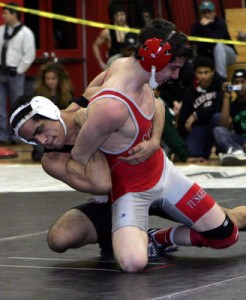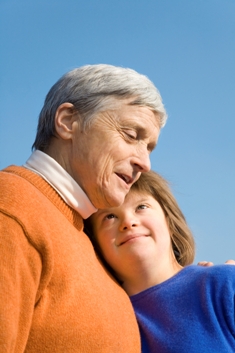 Varsity wrestler Reid Paswall had an idea. In November 2009, with the team's opening match only days away, he approached the athletic director at his Somers (NY) High School to suggest that the captains for the opener be two classmates who were not even members of the team.
Varsity wrestler Reid Paswall had an idea. In November 2009, with the team's opening match only days away, he approached the athletic director at his Somers (NY) High School to suggest that the captains for the opener be two classmates who were not even members of the team.
The two -- Adam Stein and Matthew Moriarty -- were special-needs students with Down syndrome. "I thought," Paswall (in red singlet in photo) told the athletic director, "that we can have our special-needs kids go out and shake the other team's captain's hands, and . . . represent Somers."
"If he could . . . ."
Paswall's idea won immediate support from the Tuskers' varsity wrestling coach, the school's special education teacher, and the other wrestlers. The teacher said that Stein and Moriarty each "loves sports, . . . loves being popular, . . . loves walking down the halls and knowing everybody, [and] if he could, . . . would go to every sporting event the school ever had."
"One of the things we are trying to do," added the coach, "is not focus on winning, winning, winning. . . . We want to focus on being a better person also." Naming the two special captains, the coach explained, "fits right into some of the things we talk about in practice."
In the week leading up to the opening match, the special education class made posters for the team. At the match, the two honorary captains received a standing ovation, exchanged the customary handshakes with the other team's captains, and then participated in all the hand slaps, chest bumps and other celebratory athletic ritutals, savoring an athletic memory to last a lifetime.
This story's lesson: "the urge to serve others"
"True heroism," said humanitarian and tennis great Arthur Ashe, "is not the urge to surpass all others at whatever cost, but the urge to serve others at whatever cost."
Earlier this year, best-selling author Brad Meltzer published his first non-fiction book, "Heroes for My Son," a collection of 52 one-page essays about men and women whose values he wanted his 8-year-old and other children to respect. Some of the essays profiled famous people from all walks of life, including sports; other essays profiled people who lived nobly but in virtual anonymity. Echoing Ashe, Meltzer told National Public Radio that each essay carried a common theme: "[T]he one thing you need . . . to be a hero is you have to help someone."
The point made by both Ashe and Meltzer is that true sports heroes use their talent as a vehicle to make life a little better for someone else -- to make a difference that never appears on the scoreboard. Professional athletes may deserve respect for athletic skills unattainable by most Americans; they may be stars, public figures, and entertainers; they may even thrill millions with big plays when the chips are down. But a pro does not become a "hero" merely for throwing a touchdown pass or hitting a walk-off home run. Athletes, after all, play games.
Bill Demong, the first American to win an Olympic gold medal in Nordic skiing, defined sports heroism after his 2010 triumph in Vancouver: "What you do after the medal determines whether or not you really are a hero."
Professional athletes enjoy both advantages and opportunities -- advantages from good health and rare athletic skill, and opportunities from performing on a national stage unavailable to most other Americans. Recognizing their blessings, many pros seize opportunities to donate their time to worthy causes because they know that, like other celebrities, they attract media attention. As players' salaries have skyrocketed in the past generation or two, professional athletes have even used their financial success to endow foundations and other charitable initiatives. 
High school varsity athletes play on a smaller stage than do pros, but even that stage isn't shared with most of their fellow students. Few people at Somers High School likely remember that Reid Paswall won his 135-pound match on that opening day, but wrestling provided him and his teammates an opportunity (as Brad Meltzer put it) "to help someone" through generosity thatwasn't recorded on any score sheet.
At its best, this opportunity to help is what high school sports should be about - the opportunity to combine passion to win with passion to influence a few lives, and not just the lives of the players themselves. Just ask Adam Stein and Matthew Moriarty, the co-captains whose personal dignity grew minute by minute at the wrestling match. Or the teachers, coaches, teammates, classmates, and opponents who attended the match for entertainment, yet left with an important lesson in social responsibility.
The lesson was, as a Somers wrestling captain put it, that people with disabilities are "part of our lives. . . . They're actual people, and that's important."
Source: Reid Paswall's story is told in Rick Carpiniello, Paswall, Somers Wrestlers Get the Word Out, The Journal News (White Plains, N.Y.), Dec. 5, 2009.
Photo of Reid Paswall courtesy of www.LoHud.com.
Created December 1, 2010








